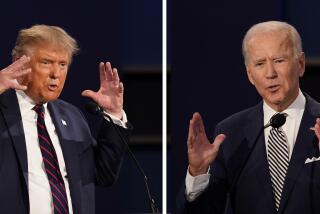Tuning In The Global Village : Who Will Rule the News? Rivals Race Against CNN : The Atlanta-based network got a head start. But Europeans are competing for revenue and prestige.
- Share via
ATLANTA
During the height of the Gulf War, a producer on CNN’s foreign desk in Atlanta picked up the phone. “This is Col. Moammar Kadafi,” the caller announced. “Put me on the air.”
A crank, the producer thought, and hung up. An instant later, the phone rang again. This time Eason Jordon, CNN’s boyish-looking executive in charge of its war coverage, grabbed the line. He too hung up--nut calls, after all, were coming in faster than Scud missiles.
Within minutes an indignant Libyan ambassador was on the phone to a chastened CNN demanding to know why no one would speak to his boss. Kadafi wanted to tell the world his plan for ending the war.
And just two hours after that, CNN was beaming a live interview with the Libyan dictator from Kadafi’s Bedouin tent. Isolated and rebuffed by his peers, Kadafi suddenly had a captive global audience.
Such is the clout of the world’s first global TV news channel. Available in 135 countries, CNN reaches 53 million households outside the United States--a minuscule 1% of the world’s population, but unarguably its ruling and cultural elites.
It is an arena that other satellite broadcasters are now racing to enter. A huge prize is at stake.
The winner could command audiences in the tens of millions of viewers. Advertising revenue would be commensurate. And there is the additional cachet that comes from owning a network that serves as a kind of giant party line for international diplomacy--the number that everyone from superpower statesman to tin-pot dictator calls to rattle a saber or appeal for peace.
Although several entertainment networks strive to be global, cultural differences so far limit the success of most. (One exception is MTV, which speaks to young people around the world through the common language of pop music.)
But news, rooted in information rather than entertainment, crosses international borders more readily.
The British Broadcasting Corp., whose crackling short-wave radio dispatches pioneered global broadcasting more than 60 years ago, has taken direct aim at CNN, launching the competing World Service Television for Europe, Africa and Asia. It is hoping to add audiences in North, Central and South America, Australia and New Zealand by the end of next year.
Analysts also predict that the Japanese will soon resurrect plans abandoned last year to establish a satellite news channel throughout Southeast Asia.
In Europe, a consortium of 11 state-owned broadcasters in January will launch a pan-European satellite news channel called Euronews. CNN is trying to sign up local broadcasters as partners to build “vernacular” 24-hour news channels in Germany, Japan and Latin America. Middle East Broadcasting, an Arabic-language news channel beaming to the Middle East and North Africa, is now on 18 hours a day. And executives at Rupert Murdoch’s News Corp. are drawing up long-range plans to link Sky News in Britain with its sister company, Fox TV, in the United States.
From his Atlanta office, CNN President Tom Johnson sees the global television revolution as in its infancy.
While nearly every cable home in the United States already gets CNN or its sister network, Headline News, there is ample room for growth overseas, where most viewers still can’t watch the network’s offerings without their own satellite dish. But that situation is changing rapidly, says Johnson, as he balances a world map on one knee and draws imaginary circles with his index finger around continents.
“Just this year we’ve gone up on Arabsat, India’s Palapa, Superbird in Japan and Astra over Europe, four of the most powerful satellites in the world,” he triumphantly points out. “These require smaller dishes and put us within reach of the average consumer.”
Revenue from CNN International more than doubled last year to $51.3 million. And network officials expect it to grow a whopping 20% annually over the next several years--unrivaled at a time when most media companies are shrinking.
On Johnson’s wall, resembling an outsized electrocardiogram, is a five-foot timeline of CNN’s ratings--the peaks and valleys over the last 10 years. A red spike soars off the chart when it hits January, 1991--the start of the Gulf War.
The spike represents a defining moment not only for CNN but also for the future of global news coverage.
It was perhaps never so clear as during the war that television had become a full-fledged participant in international affairs rather than simply a witness.
Critics complained that instead of reporting events, CNN--as the only news organization left in Baghdad--was acting more like a Western Union messenger boy on behalf of the Iraqis. On the other hand, U.S. and allied military briefings carried live on CNN were clearly part of the coalition’s propaganda campaign against Iraqi President Saddam Hussein.
Responds Johnson: “Better countries exchange messages through us than missiles.”
The war also spurred new competition for CNN.
“There was tremendous admiration for CNN, but also mortification that it was the sole source of images for the war,” says Bill Grantham, a Paris TV consultant. “Among Europeans, many feel a need for a channel that more corresponds to local attitudes and culture.”
The result is Euronews, the service based in Lyon, France, that is being launched by a consortium of European broadcasters.
Also, a privately funded German-language, all-news channel, n-tv, substantially backed by Time Warner, is scheduled to begin transmitting next month throughout much of Central Europe from its Berlin headquarters.
Fears about Yankee bias in the news are not lost on CNN executives. Already 45% of CNN International’s programming--the portion distributed outside the United States--is produced especially for the international feed. CNN promises to boost that to 70%. The network is also hiring more nationals as correspondents.
But the greatest challenge to CNN may be the BBC’s World Service Television.
The impetus came from John Tusa, the Czechoslovakian-born head of the BBC’s World Service, which provides shortwave radio broadcasts to hundreds of millions of listeners worldwide. “We’ve made great strides in a short time, faster than anyone expected,” he says.
Having missed the Gulf War, World Service Television began broadcasting into Europe in March, 1991. By November, it was beaming its first 24-hour commercial channel of news and information, distributed by satellite to an area stretching from the Mideast to the Asia-Pacific basin and containing more than half the world’s population.
There are marked differences between CNN and World Service Television.
“CNN is culturally a very American channel,” says Lou Friedland, a journalism professor at the University of Wisconsin. “The people who started it came out of local news and developed a news style of live broadcasting.” The BBC, however, “is more analytical, gives a wider perspective. . . . Their presentation is what Americans would think of as dry, Europeans as serious.”
Unlike CNN, which simply licenses to a local distributor, World Service Television is relying on local partners for marketing and technical support.
In Asia, World Service Television signed up with Hong Kong’s Star TV, which is carried on the far-reaching Asiasat satellite. In Japan, BBC is teaming up with the giant Tokyo-based Nissho Iwai.
And in Europe, an 18-hour service offers programming from the two national BBC channels. World Service Television is picked up by Polish cable operators and, in Moscow, is distributed by microwave.
Whether there will be other truly global news challengers is not known. More likely, experts think, there will be dozens of more narrowly focused, non-English language satellite news channels covering specific regions around the world. It is not difficult to imagine a future when every developed country has its own 24-hour news channel.
“The real growth over the next five to 10 years will be the ‘vernacular’ networks, which are designed to appeal to the growing middle class,” says Friedland. “This is a whole new phase of world news--one which we’ve barely begun to see.”
Lippman reported from Atlanta and Tuohy from London.
More to Read
The biggest entertainment stories
Get our big stories about Hollywood, film, television, music, arts, culture and more right in your inbox as soon as they publish.
You may occasionally receive promotional content from the Los Angeles Times.










